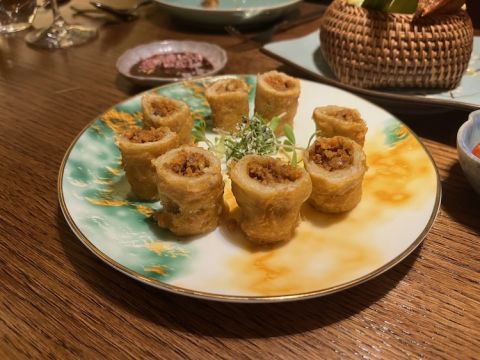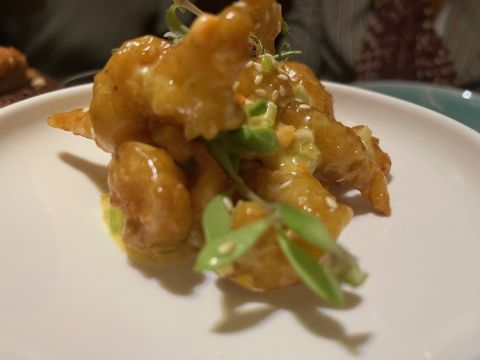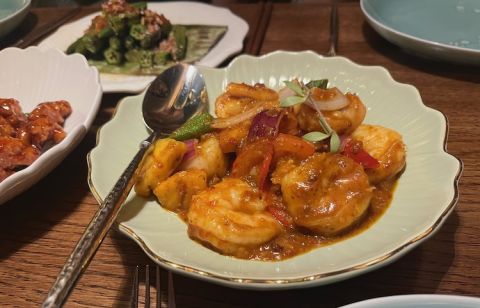The press release was polite, well written, highly enthusiastic about the restaurant in question and definitely piqued my interest. It basically said that the opening of the Nanyang Blossom restaurant was not to be missed: the service was first class, but more importantly the cooking was Asian Nanyang, a synonym for Nyonya cooking.
Nyonya cooking is to my taste one of the world’s finest, if least well known. Also known as Peranakan, it is a style of cooking that originated in the 15th century when China ‘opened up’ for the very first time. I first encountered it in Singapore on my visit there in 2010 when I wrote,
The name refers to the descendants of Chinese traders who intermarried with women living along the British-controlled straits of Malaya or the Dutch-controlled island of Java from the late 15th and 16th centuries. The name Nyonya refers to the women who undertook the cooking and over the years absorbed so many different culinary influences: Indian dry spices, Malay curries, Thai herbs, as well as the differing styles of the many Chinese regions. Then there is the buah keluak, the nut from the kepayang tree that grows wild across Indonesia and Malaysia, and is the distinctive ingredient of Nyonya cooking.
Now over 500 years old, Nyonya cooking is far more than fusion. It is a manifestation of a very distinctive culture, and its renaissance today among young Singaporeans is due to the fact that, like many others around the world who now are finally beginning to appreciate the importance of their forebears’ cooking, they see it as a nostalgic vision of the past that could, even quite recently, have so easily disappeared.
The food bears the hallmarks of the best of home cooking. Many of the time-darkened dishes are slow cooked and so take on a rich, unctuous texture. The dishes are hot, so fitting for a steamy climate, but while less spicy than Indian or Thai food, the flavours are more intense than most Chinese food. Nyonya cooking is also particularly labour-intensive, and creating it is a labour of love.
In this article I referred to three restaurants which specialised in Nyonya cooking: two in Singapore (True Blue and Candlenut, for which its talented chef Malcolm Lee has won a Michelin star) and Sedap in London, which sadly has now closed – but this made the recent opening of Nyonyang Blossom all the more interesting.
Nyonyang Blossom is located at a smart address in Knightsbridge Green, the short lane that runs between Knightsbridge and Harrods and has been for decades home to Signor Sassi and Zuma restaurants and to Cutler and Gross, provider of eyewear to the stars, which has been based here since 1969. But as we pushed open the front door of the restaurant, disappointment set in. Perhaps authenticity was not to be the keynote of this meal.
We were greeted by a smiling young woman wearing the traditional cheongsam, Chinese sheath-dress, who made us welcome but with a strong Eastern European accent. We walked into a long, narrow, windowless room which had a dumbwaiter at the far end and the kitchen obviously in the basement. Wood is clearly the decorator’s theme and the chairs seem enormous – and are difficult to budge.
We were handed a host of heavily bound menus and a wine list: an à la carte menu as well as a list of signature dishes which range from Knightsbridge crispy beef ribs (£32) to a Canadian lobster baked with cheese, sweet potato and garlic (£58). Then there is a tasting menu at £88 per person which includes a botanical soup dumpling as well as a dish of Nyonya seafood baked with rice in a clay pot.
We settled down to study the à la carte menu and my disappointment continued. Where were the homemade curries, the candlenut dishes that are the hallmark of Nyonya cooking? Where was the feminine touch?
I ordered for the three of us. As first courses, a pleasing dish of soft-shell crab with apple salsa pictured at the top of this review; yellow crab fritters with ginger flower and lime leaf; the Nanyang chicken roll pictured immediately above and the Penang nutmeg prawns shown below, while JR studied the wine list. This has all the names: Lafite 1986, Mouton 2001 and Palmer 2008 as well as top whites and champagnes. JR was more intrigued by their slightly more esoteric white wine selection, in particular the 2018 Petracs Dry Furmint from Oremus in Tokaj, although its price of £310 was a turn-off. Instead, and in deference to our white wine-drinking guest with Lebanese antecedents, she chose a bottle of Merwah, an indigenous Lebanese grape variety mentioned in these nine articles on this site, from Chateau Ksara in Lebanon (£70) that was a little neutral and flabby.
We followed these with two main courses, a dish of red honey chicken with toasted walnuts and sambal (basically sweet-and-sour) prawns (£30) which were good but overshadowed by a dish of crisply fried okra served with salted fish that was delicious: the combination of intense spice and the ability to eat these with one’s fingers made this dish irresistible. Our main courses can be seen below.
Our desserts – a burnt cream (aka crème brûlée) and a black sticky rice pudding – were disappointing. My bill without coffee came to £283.75 for the three of us.
Our reactions to Nyonyang Blossom were mixed. Our friend, who had never tasted Nyonya cooking before, was impressed. I, on the other hand, having visited Singapore and eaten this distinctive style of cooking on several occasions while I was there, left disappointed. Perhaps sentimentally, I feel that chef Daren Liew, ex Duddell’s in London and Hakkasan, and his partners should have been bolder and written a menu that was simultaneously easy enough to understand and at the same time distinctly Nyonya.
There are plenty of restaurants in London which specialise in styles of cooking as distinctive as Nyonya yet without its rich history and relevance today. I believe that London can readily accept a restaurant that specialises in the colourful and highly distinctive Nyonya cooking.
Nanyang Blossom 12 Knightsbridge Green, London SW1X 7QL; tel: +44 (0)204 529 3643
Every Sunday, Nick writes about restaurants. To stay abreast of his reviews, sign up for our weekly newsletter.

















